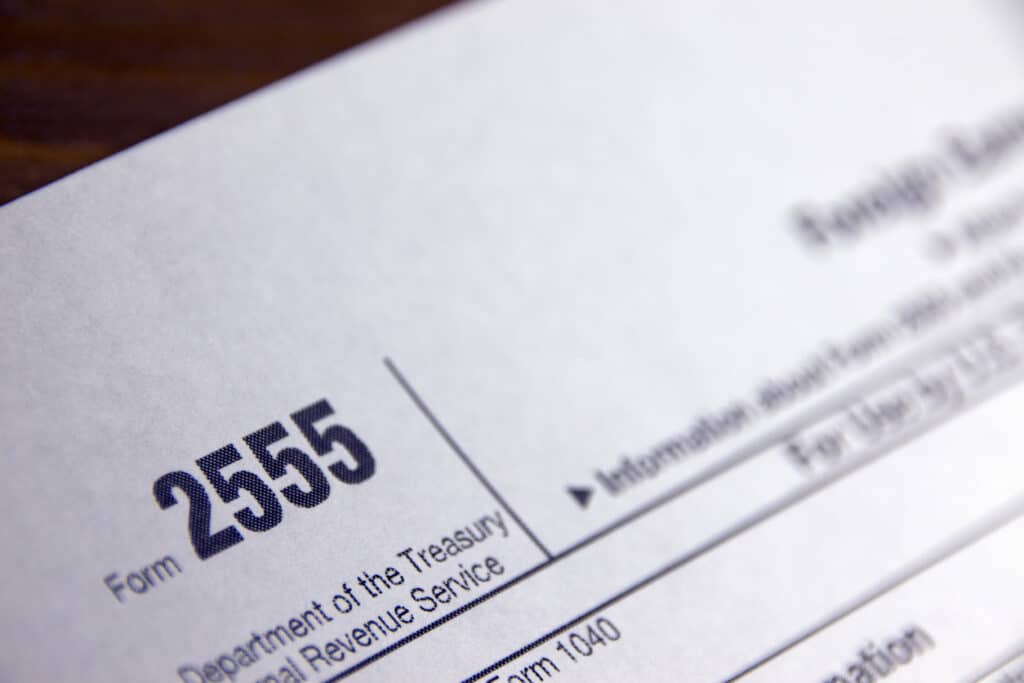Form 2555 Instructions: A Complete Guide for American Expats

Form 2555 is the IRS tax form that American citizens and green card holders use to claim the Foreign Earned Income Exclusion (FEIE) when living and working abroad. This form allows qualifying expats to exclude foreign-earned income from US taxation, up to $126,500 for 2024 tax returns and $130,000 for 2025.
What Form 2555 does: It lets you exclude foreign wages, salaries, and self-employment income from US taxes if you meet specific residency or physical presence requirements abroad. Since 2019, all expats must use Form 2555 (the simplified 2555-EZ was discontinued after 2018).
Who needs it: Any American living abroad who wants to exclude foreign-earned income from their US tax return must file Form 2555 with Form 1040. You cannot claim the Foreign Earned Income Exclusion without this form.
Good news for expats: IRS data shows that 2 out of 3 American expats owe $0 in US taxes after properly using available exclusions and credits like those claimed on Form 2555.
Why Every American Expat Should Know About Form 2555
Living abroad doesn’t free you from US filing requirements, but it doesn’t mean you’ll owe a fortune. Form 2555 is how you claim the Foreign Earned Income Exclusion (FEIE), essentially telling the IRS that income earned while genuinely living and working abroad shouldn’t be subject to double taxation.
Here’s what makes Form 2555 so valuable:
- Excludes foreign-earned income from US taxation
- Can eliminate your entire US tax liability if used correctly
- Works for both employees and self-employed expats
- Provides long-term tax planning benefits
Without filing Form 2555, you can’t claim the FEIE. You must attach this form to your regular Form 1040 to access this exclusion.
What Income Qualifies (And What Doesn’t)
The FEIE applies to earned income only, money you actively work for abroad:
Qualifying Income:
- Salaries and wages from foreign employers
- Self-employment income from work performed abroad
- Professional fees, commissions, and bonuses
- Tips and overtime pay
Income That Doesn’t Qualify:
- Pension or retirement distributions
- Investment income (dividends, interest, capital gains)
- Social Security benefits
- US government employment income
- Income earned in international waters or Antarctica
Many expats combine the FEIE with the Foreign Tax Credit to maximize savings, especially when paying taxes to high-tax countries like Germany or France.
But you can’t double dip on the same income if you choose to use both FEIE and Foreign Tax Credit, but combining them strategically on different income types maximizes your tax savings.
Step 1: Qualify Using One of Two Tests
To use Form 2555, you must pass either of the tests below. Choose whichever works better for your situation, you don’t need both.
Physical Presence Test: The Flexible Option
Be physically present in foreign countries for at least 330 full days during any 12-month period.
Why most expats love this test:
- The 330 days don’t need to be consecutive
- You can choose any 12-month period that works best
- Allows up to 35 days in the US per year
- Perfect for digital nomads and frequent travelers
Example: Moved to Thailand in June 2024? You could use the June 2024 to May 2025 period to qualify for your 2024 tax return.
Bona Fide Residence Test: For True Residents
Establish genuine residence in a foreign country for an uninterrupted period, including an entire tax year.
This test considers:
- Where you maintain your permanent home
- Your employment arrangements and contracts
- Social and economic ties to the foreign country
- Your stated intention about the length of stay
Bona fide residence requires a full calendar year commitment, while physical presence offers more timing flexibility.
Step 2: Use Form 2555 (The Only Option Since 2019)
Important update: Form 2555-EZ was discontinued after the 2018 tax year. All expats claiming the Foreign Earned Income Exclusion must now use the complete Form 2555, regardless of how simple their situation might be.
Why This Change Benefits Expats:
- Access to Foreign Housing Exclusion: Can provide thousands in additional savings for expats in expensive cities like London, Zurich, or Tokyo
- More comprehensive coverage: Handles complex situations like self-employment income
- Future-proof filing: No need to switch forms if your situation becomes more complex
- Complete tax optimization: Ensures you’re getting every possible benefit available
The silver lining: While Form 2555 has more sections than the old 2555-EZ, most expats find the additional benefits (especially the Foreign Housing Exclusion) more than worth the extra time spent.
Real Expat Scenarios: How Form 2555 Works
Scenario 1: Software Engineer in Portugal
Income: €70,000 annually in Lisbon
Tax Strategy: Physical Presence Test + Foreign Tax Credit combination
Result: $0 US tax owed (Portugal’s higher tax rates provide full offset)
Scenario 2: English Teacher in Vietnam
Income: $30,000 annually in Ho Chi Minh City
Tax Strategy: FEIE via Form 2555
Result: $0 US tax owed (income entirely excluded)
Scenario 3: Freelance Marketing Consultant
Income: $95,000 while traveling through Asia
Tax Strategy: Physical Presence Test with careful travel documentation
Result: $0 US tax owed with proper record-keeping
Essential Information to Gather for Form 2555
Having these documents ready makes Form 2555 filing smooth and accurate:
Required Documentation:
- Employer information: Names and addresses (foreign and US)
- Detailed travel records: Every international trip with exact dates
- Income documentation: Foreign tax documents, pay stubs, earnings statements
- Previous Form 2555 (if you filed one before)
- Housing expense records (for Foreign Housing Exclusion)
Keep a travel log all year. Use apps like TripIt or a simple calendar, this documentation is crucial for the Physical Presence Test.
What If You’re Behind on Filing?
Don’t panic. Thousands of expats catch up every year using the IRS Streamlined Filing Compliance Procedures:
- Minimal penalties for non-willful failure to file
- File up to 3 years of back tax returns
- Must file 6 years of FBAR reports
- Must certify non-willful failure to comply
The key: Address it proactively. The IRS is more understanding when you come forward voluntarily.
Critical Deadlines and Extensions for Expats
- Standard deadline: April 15
- Automatic expat extension: June 15 (no form required, just file by this date)
- With Form 4868: October 15
- With Form 2350: Additional extension to meet test requirements
Important: Extensions cover filing, not payment. Interest accrues from the original due date if you owe taxes.
Common Form 2555 Mistakes That Cost Money
- Mixing the tests: Don’t try to use both Physical Presence and Bona Fide Residence
- Poor travel documentation: Inadequate records can disqualify your entire FEIE claim
- Including wrong income types: Only earned income qualifies
- Missing the Housing Exclusion: This can save thousands in expensive expat destinations
- Ignoring state taxes: Some states continue taxing former residents abroad
When to Get Professional Help
While many situations are straightforward, these circumstances benefit from expert guidance:
- Multiple income sources across different countries
- Self-employment income with complex international clients
- Stock options or RSUs from US companies
- Previous filing gaps or compliance issues
- High-tax countries where strategy optimization matters
Your Peace of Mind Next Steps
If you feel confident about a straightforward situation, download Form 2555 from the IRS website and use this guide alongside their instructions.
But if you’re thinking: “This seems more complex than I expected” or “I want to make sure I’m getting every possible benefit,” you’re not alone. US expat tax rules are genuinely complicated, and mistakes can be expensive.
Ready to get your expat taxes done right? Get started with Greenback today, and you’ll have peace of mind knowing that your taxes were handled correctly.
Have questions about Form 2555 or your specific expat tax situation?
Contact us, and one of our Customer Champions will be happy to help. For specific advice tailored to your unique circumstances, you can also get a consultation with one of our expat tax experts.



